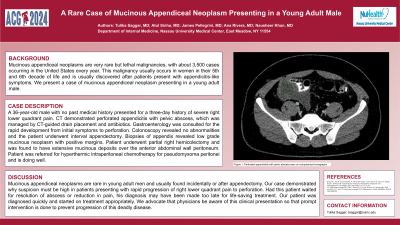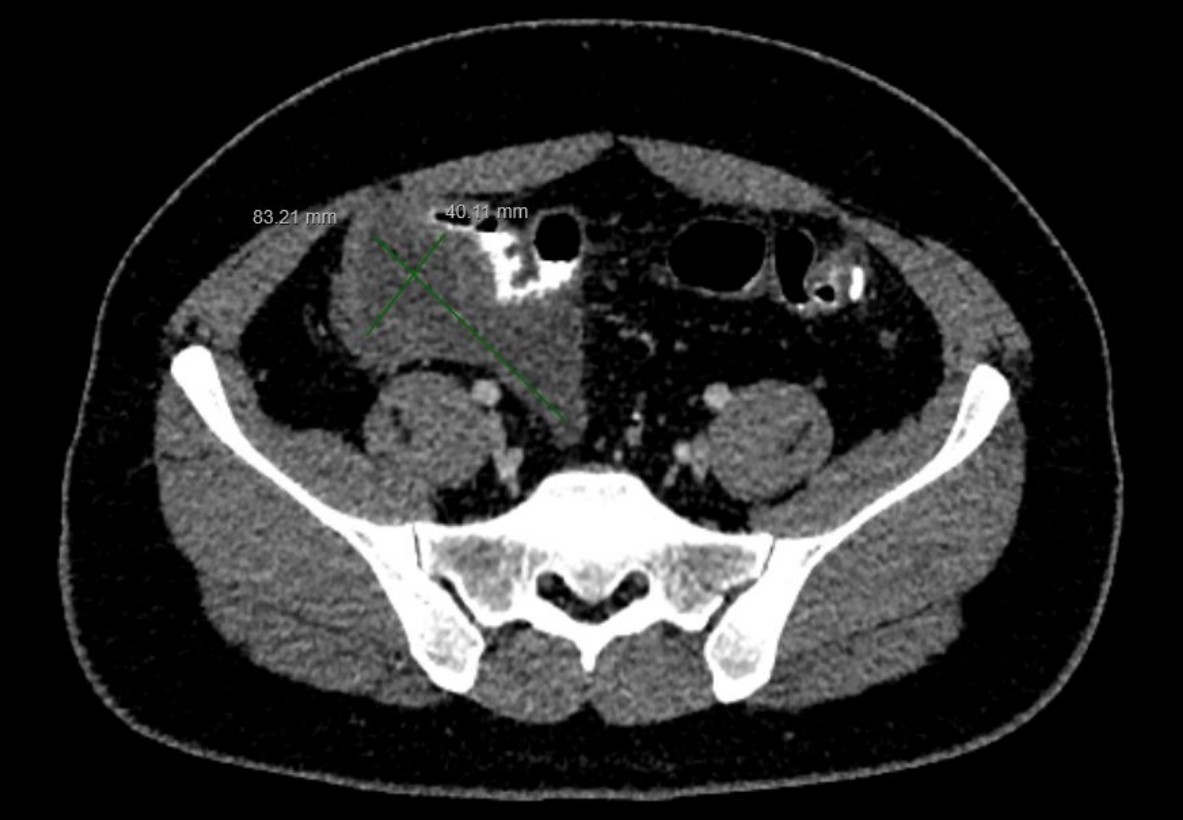Monday Poster Session
Category: Colon
P2090 - A Rare Case of Mucinous Appendiceal Neoplasm Presenting in a Young Adult Male
Monday, October 28, 2024
10:30 AM - 4:00 PM ET
Location: Exhibit Hall E

Has Audio

Tulika Saggar, MD
Nassau University Medical Center
East Meadow, NY
Presenting Author(s)
Tulika Saggar, MD1, Atul Sinha, MD1, James R. Pellegrini, MD2, Ana P. Rivera, MD3, Nausheer Khan, MD1
1Nassau University Medical Center, East Meadow, NY; 2Nassau University Medical Center, Great River, NY; 3Nassau University Medical Center, Amityville, NY
Introduction: Mucinous appendiceal neoplasms are very rare but lethal malignancies, with about 3,500 cases occurring in the United States every year. This malignancy usually occurs in women in their 5th and 6th decade of life and is usually discovered after patients present with appendicitis-like symptoms. We present a case of mucinous appendiceal neoplasm presenting in a young adult male.
Case Description/Methods: A 36-year-old male with no past medical history presented for a three day history of severe right lower quadrant pain. CT demonstrated perforated appendicitis with pelvic abscess, which was managed by CT-guided drain placement and antibiotics. Gastroenterology was consulted for the rapid development from initial symptoms to perforation. Colonoscopy revealed no abnormalities and the patient underwent interval appendectomy. Biopsies of appendix revealed low grade mucinous neoplasm with positive margins. Patient underwent partial right hemicolectomy and was found to have extensive mucinous deposits over the anterior abdominal wall peritoneum. Patient was referred for hyperthermic intraperitoneal chemotherapy for pseudomyxoma peritonei and is doing well.
Discussion: Mucinous appendiceal neoplasms are rare in young adult men and usually found incidentally or after appendectomy. Our case demonstrated why suspicion must be high in patients presenting with rapid progression of right lower quadrant pain to perforation. Had this patient waited for resolution of abscess or reduction in pain, his diagnosis may have been made too late for life-saving treatment. Our patient was diagnosed quickly and started on treatment appropriately. We advocate that physicians be aware of this clinical presentation so that prompt intervention is done to prevent progression of this deadly disease.

Disclosures:
Tulika Saggar, MD1, Atul Sinha, MD1, James R. Pellegrini, MD2, Ana P. Rivera, MD3, Nausheer Khan, MD1. P2090 - A Rare Case of Mucinous Appendiceal Neoplasm Presenting in a Young Adult Male, ACG 2024 Annual Scientific Meeting Abstracts. Philadelphia, PA: American College of Gastroenterology.
1Nassau University Medical Center, East Meadow, NY; 2Nassau University Medical Center, Great River, NY; 3Nassau University Medical Center, Amityville, NY
Introduction: Mucinous appendiceal neoplasms are very rare but lethal malignancies, with about 3,500 cases occurring in the United States every year. This malignancy usually occurs in women in their 5th and 6th decade of life and is usually discovered after patients present with appendicitis-like symptoms. We present a case of mucinous appendiceal neoplasm presenting in a young adult male.
Case Description/Methods: A 36-year-old male with no past medical history presented for a three day history of severe right lower quadrant pain. CT demonstrated perforated appendicitis with pelvic abscess, which was managed by CT-guided drain placement and antibiotics. Gastroenterology was consulted for the rapid development from initial symptoms to perforation. Colonoscopy revealed no abnormalities and the patient underwent interval appendectomy. Biopsies of appendix revealed low grade mucinous neoplasm with positive margins. Patient underwent partial right hemicolectomy and was found to have extensive mucinous deposits over the anterior abdominal wall peritoneum. Patient was referred for hyperthermic intraperitoneal chemotherapy for pseudomyxoma peritonei and is doing well.
Discussion: Mucinous appendiceal neoplasms are rare in young adult men and usually found incidentally or after appendectomy. Our case demonstrated why suspicion must be high in patients presenting with rapid progression of right lower quadrant pain to perforation. Had this patient waited for resolution of abscess or reduction in pain, his diagnosis may have been made too late for life-saving treatment. Our patient was diagnosed quickly and started on treatment appropriately. We advocate that physicians be aware of this clinical presentation so that prompt intervention is done to prevent progression of this deadly disease.

Figure: Perforated appendicitis with pelvic abscess seen on CT
Disclosures:
Tulika Saggar indicated no relevant financial relationships.
Atul Sinha indicated no relevant financial relationships.
James Pellegrini indicated no relevant financial relationships.
Ana Rivera indicated no relevant financial relationships.
Nausheer Khan indicated no relevant financial relationships.
Tulika Saggar, MD1, Atul Sinha, MD1, James R. Pellegrini, MD2, Ana P. Rivera, MD3, Nausheer Khan, MD1. P2090 - A Rare Case of Mucinous Appendiceal Neoplasm Presenting in a Young Adult Male, ACG 2024 Annual Scientific Meeting Abstracts. Philadelphia, PA: American College of Gastroenterology.
